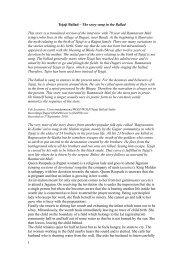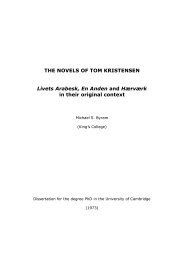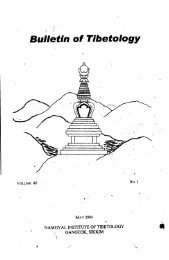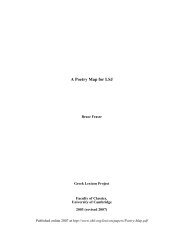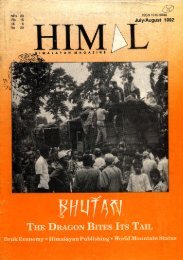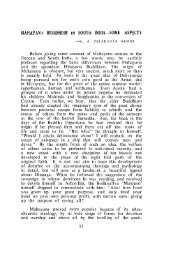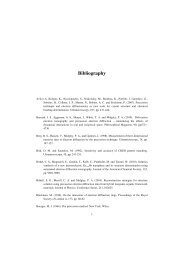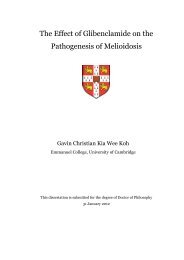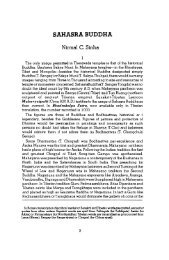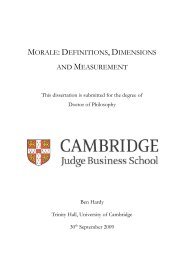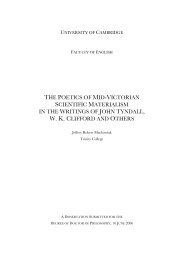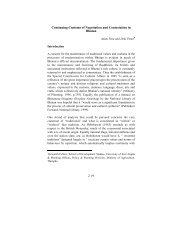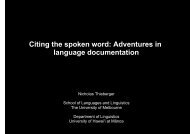The Crusades, the Genoese and the Latin East - DSpace at ...
The Crusades, the Genoese and the Latin East - DSpace at ...
The Crusades, the Genoese and the Latin East - DSpace at ...
You also want an ePaper? Increase the reach of your titles
YUMPU automatically turns print PDFs into web optimized ePapers that Google loves.
[my 444<br />
emphasis] At first glance, this charter seems typical of <strong>the</strong> time, because of its similarity<br />
to many charters th<strong>at</strong> <strong>the</strong> <strong>Genoese</strong> <strong>and</strong> o<strong>the</strong>r trading communities obtained over <strong>the</strong> years from<br />
<strong>the</strong> lords of various trading cities. However, considering <strong>the</strong> history of <strong>the</strong> rel<strong>at</strong>ionship between<br />
Genoa <strong>and</strong> Gibelet this charter might seem ra<strong>the</strong>r odd: in 1154 Genoa claimed full ownership<br />
over Gibelet as well as <strong>the</strong> payment of taxes <strong>and</strong> lease fees from Guglielmo II Embriaco.<br />
However, <strong>the</strong> situ<strong>at</strong>ion is presented differently in Hugh's charter. Firstly, Hugh appears as <strong>the</strong><br />
lord, by divine right, of Gibelet. From this position, after consulting his people in a feudal<br />
manner, he granted rights to <strong>the</strong> <strong>Genoese</strong>. <strong>The</strong> issue of outst<strong>and</strong>ing debts or any sort of future<br />
payment due to <strong>the</strong> commune are never mentioned in <strong>the</strong> charter. None<strong>the</strong>less, Favreau-Lilie saw<br />
in this charter an achievement for Lanfranco Alberico <strong>and</strong> <strong>the</strong> <strong>Genoese</strong>, because <strong>at</strong> least <strong>the</strong>y<br />
found a way for <strong>the</strong> commune of Genoa to gain some economic benefits from Gibelet.<br />
Lanfrancus Albericus sollte allem Anschein nach in Verh<strong>and</strong>lungen zumindest bessere<br />
Konditionen für den genuesischen H<strong>and</strong>el in Gibelet durchsetzen, wenn schon die<br />
Eigentumsansprüche Genuas <strong>and</strong> damit eine Anerkennung der jährlichen<br />
Zahlungsverpflichtung des Embriacus an die Kommune nicht durchsetzbar waren 445<br />
In her observ<strong>at</strong>ions, Favreau-Lilie assessed <strong>the</strong> achievements of Lanfranco Alberico, by<br />
looking <strong>at</strong> <strong>the</strong>se negoti<strong>at</strong>ions from Genoa's point of view. It is certainly true th<strong>at</strong> in this<br />
agreement Genoa <strong>at</strong> least secured some benefits, because <strong>at</strong> no point in <strong>the</strong> future was it ever able<br />
to regain <strong>the</strong> ownership of Gibelet or receive payment for <strong>the</strong>se possessions. Favreau-Lilie is<br />
probably also right in saying th<strong>at</strong> <strong>the</strong>re are no grounds to support <strong>the</strong> hypo<strong>the</strong>sis (Byrne's) th<strong>at</strong><br />
Guglielmo II Embriaco paid Genoa <strong>the</strong> annual payment between 1154 <strong>and</strong><br />
1164 446<br />
<strong>The</strong> question<br />
of <strong>the</strong> financial debts of <strong>the</strong> lords of Gibelet over <strong>the</strong> years will be fur<strong>the</strong>r discussed in <strong>the</strong><br />
following pages. However, <strong>the</strong> charter of Hugh II from 1168 requires fur<strong>the</strong>r examin<strong>at</strong>ion before<br />
discussion of debts can proceed. It will be argued here th<strong>at</strong> Hugh's charter to Genoa gives<br />
valuable insight into <strong>the</strong> development of <strong>the</strong> rel<strong>at</strong>ionship between Genoa <strong>and</strong> Gibelet.<br />
Fur<strong>the</strong>rmore, <strong>the</strong> implic<strong>at</strong>ions of <strong>the</strong> charter go even beyond some economic benefits.<br />
<strong>The</strong> privileges granted by Hugh were explicitly limited to <strong>the</strong> <strong>Genoese</strong>:<br />
<strong>the</strong> inhabitants of<br />
Genoa <strong>and</strong> its archbishopric: `omnibus hominibus lanue qui Bunt manentes in civit<strong>at</strong>e lanue et in<br />
toto archiepiscop<strong>at</strong>u. '447 <strong>The</strong> question of `who is a <strong>Genoese</strong>' was an important one as far as<br />
grants of this n<strong>at</strong>ure are considered. For example, in a charter from 1191, <strong>the</strong> concessions granted<br />
to <strong>the</strong> <strong>Genoese</strong>, applied to <strong>the</strong> residents of all Liguria <strong>and</strong> beyond, from Portovenere to<br />
4441 Libri lurium, vol. 1/2, no. 339, p. 156.<br />
445 Favreau-Lilie, Die Italianer im Heiligen L<strong>and</strong>, p. 219.<br />
446 Byrne wrote th<strong>at</strong> `it is evident th<strong>at</strong> up to th<strong>at</strong> d<strong>at</strong>e, under occasional judicious pressure from <strong>the</strong> home<br />
government, <strong>the</strong> family paid most of <strong>the</strong> censum. See Byrne, `<strong>The</strong> <strong>Genoese</strong> Colonies in Syria', p. 152;<br />
Favreau-Lilie criticised this <strong>the</strong>ory. Die Italianer im Heiligen L<strong>and</strong>, p. 218.<br />
4471 Libri lurium, vol. 1/2, no 339, p. 156.<br />
126



